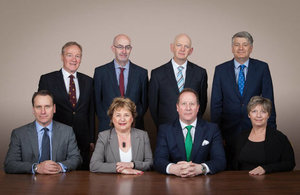Business Secretary Kwasi Kwarteng has today (Wednesday 11 May) written to the Competition and Markets Authority (CMA) instructing them to carry out an in-depth Phase 2 investigation of the proposed acquisition of the Perpetuus Group by Shanghai Kington Technologies and others on national security grounds.
The Business Secretary has ‘quasi-judicial’ powers under the Enterprise Act 2002 to intervene in certain mergers on public interest grounds. Today’s decision follows the completion of the Phase 1 process during which the CMA conducted an initial investigation of the potential competition implications of the transaction.
The CMA considered that it does not believe that it is or may be the case that the transaction may be expected to result in a substantial lessening of competition within a market or markets in the UK. The Phase 1 report has been published today.
Following the consideration of evidence gathered from departments across government, the Business Secretary deems that the interest of national security continues to be relevant and should be subject to further investigation. Perpetuus Group is a group of UK companies which is active in the functionalisation of graphene and other nanomaterials, which have a range of strategic applications. The government will ensure the implications of the transaction are fully considered. The CMA will report to the Business Secretary.
Business Secretary Kwasi Kwarteng said:
The UK remains firmly open for business, however we have been clear that foreign investment must not threaten our national security.
I have considered the evidence presented to me and asked the Competition and Markets Authority to undertake an in-depth investigation so we can fully consider the implications of this transaction.
The CMA will now lead the Phase 2 investigation covering the national security implications. It will have 24 weeks (subject to a possible 8-week extension) to conduct this investigation and deliver a final report to the Business Secretary.
Next steps
When the Business Secretary has received the report, he must decide from the following options, to:
- make an adverse public interest finding in relation to the acquisition on national security grounds, and, if so, to take action to remedy any adverse effects to the public interest
- make no adverse public interest finding
The Secretary of State may make a Phase 2 reference to the CMA under section 45(4) of the Enterprise Act 2002 if he believes that is or may be the case that:
- arrangements are in progress which, if carried into effect, will result in the creation of a relevant merger situation;
- the creation of that situation may be expected to result in a substantial lessening of competition within any market or markets in the UK for goods or services
- the interests of national security (being the public interest consideration mentioned in the public interest intervention notice) are relevant to a consideration of the relevant merger situation concerned; and taking account only of the substantial lessening of competition and the interests of national security, the creation of the relevant merger situation may be expected to operate against the public interest
In September 2021, the Secretary of State for Business, Energy and Industrial Strategy issued a Public Interest Intervention Notice (PIIN) in respect of the acquisition.
This instructed the CMA to carry out a Phase 1 investigation on both competition and jurisdictional issues. Meanwhile, the government has been carrying out an investigation on national security grounds.
The ability to intervene in this fashion falls within the Business Secretary’s statutory powers under the Enterprise Act 2002.
The Enterprise Act 2002’s main purpose is to enable the Competition and Markets Authority to scrutinise and intervene in potentially anti-competitive mergers and acquisition activity.
The Enterprise Act 2002 also allows the relevant UK Secretary of State to make a quasi-judicial decision to intervene in mergers under the following public interest considerations:
- national security
- media plurality
- the stability of the UK financial system
- to combat a public health emergency
If the relevant Secretary of State decides to issue a PIIN, the CMA and the relevant government departments will investigate and prepare a report to assess the transaction in greater detail. If the relevant Secretary of State refers a merger on public interest grounds, he or she also takes the final decision on whether the merger operates, or may be expected to operate against the public interest, and on any remedies for identified public interest concerns.
The ability to intervene in transactions on the grounds of national security within the Enterprise Act 2002 was replaced by the National Security and Investment Act 2021 when it came into force from 4 January 2022. As this intervention was announced before the National Security and Investment Act 2021 commenced, it continues to be assessed under the Enterprise Act 2002 regime.
